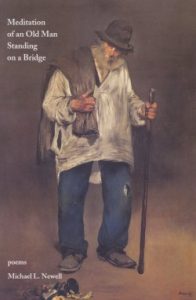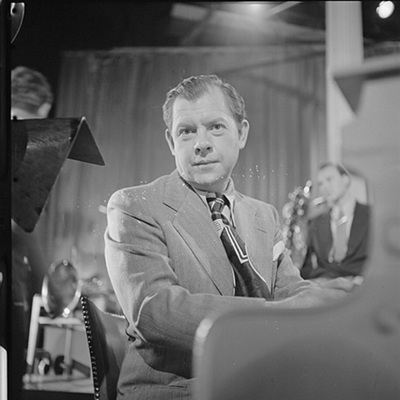In Memory of Two Crooners
by Michael L. Newell
Let’s hear it for Bing and Frank
(before he was chairman of the board).
Their smooth crooning
set crowds on fire, made young girls swoon,
ignited bodies and souls
to swing and sway, and generated
memories (that lasted for decades)
for an up and coming generation,
as they redefined popular music,
intertwined it with jazz,
broke boundaries between audiences
and performers, set an era
aflame dancing fast and slow, and helped
turn a bland world hip, established
it is never too soon for anyone to croon.
_____
Michael L. Newell is a retired English/Theatre teacher who has spent one-third of his life abroad. He now lives on the Oregon coast. In addition to the recent publication of his new book, Meditation of an Old Man Standing on a Bridge, he has recently had poems published in Verse-Virtual and Current.
Click here to access all of Michael L. Newell’s poetry published on Jerry Jazz Musician
To order a copy of the book, contact BELLOWING ARK PRESS 18040 7th Avenue NE Shoreline, WA 98155
















































I very much liked this heartfelt poem by Joan Donovan , So very touching and relatable..
I enjoyed both of John Stupp’s poems. They reminded me of when I was child and how different things were back then.
I especially love the ending line of this poem!
Enjoyed Robert Nisbet’s poem which captured the era and The Andrew Sisters.
I’m glad you enjoyed it, Aurora
Loved Alan Yount’s poem. My mother was a young teen during WWII,she loved Billie Holiday and so do
Robert Nisbet’s poem “Servicemen” is up to his usual high standards. The final line is especially powerful.
I’m glad you enjoyed it, Michael.
“I Got Lena To Sing To Me,” by Aurora Lewis, is a first-rate poem which captures the angst of military service during wartime, along with the pleasure and relief provided by great music.
Thank you so much Michael. Not being in the service and also not during wartime, I am so thankful that I was able to get my feeling across to my reader.
John Stupp’s “Carolina Shout” is powerful and moving.
Alan Yount’s poem “Smoking an Old Meerschaum Pipe” uses a careful attention to detail to tie together very disparate elements that come to fruition in the final stanza in a pleasing way for the reader.
Roger Singer’s “Barracks 231” — oh yeah. Very nice.
Both of Dan Smith’s poems are gentle in tone and attentive to detail. They capture fundamental truths about family relationships, and war’s effect on them.
Dear Mr. Newell:
Thanks for your kind words. I am honored to have my poems included with so many excellent poems.
“Sweet Pain” by Joan Donovan captures the power of loss, loss too personal to share.
For Aurora Davis. I think your poem on Lena really captured what you could say was the “singing tone,” on war. I have always enjoyed your poems with JJM. Thanks for your comment on my poem.
Alan, thank you for enjoying my poems. I also enjoy yours.
For Michael L. Newell. I liked your poem. It caught the “spirit” of the crooners. Being a trumpet player I have all of Harry James albums. He and Frank make some great music together. Frank did his eulogy in Las Vegas. By he way, I got your two latest books. Several of the poems have stayed on my mind. Also I can’t quit thinking I wish I had come up with the title: “Traveling Without Compass or Map.” What a great overall metaphor and title!
Mr. Yount, I thank you for your kind words about my poem. I also thank you for your support of my books. Greatly appreciated. — MLN
Wonderful poems by all. I especially enjoyed Dan Smith’s poems here. Artful…and with a deep, tangible sincerity that can only come from having lived and having felt with the heart of a poet.
hey, thanks man. DCPH forever!!!